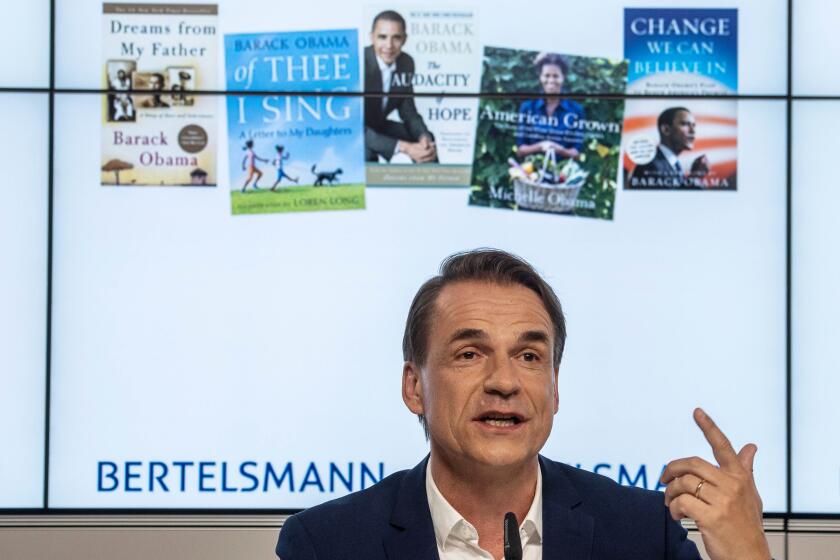Authors Guild urges DOJ to stop Simon & Schuster and Penguin Random House merger
- Share via
Several writers’ groups and organizations are calling on the government to stop one of the biggest publishing deals in recent history.
On Friday, the Authors Guild and the National Writers Union, along with four other writers’ groups and the nonprofit Open Markets Institute, sent a letter urging the Department of Justice to block the imminent publishing deal between literary giants Simon & Schuster and Penguin Random House, the third and first largest trade book publishers in the country.
“The deal would bring well more than half of key U.S. book markets under the control of a single corporation, which poses a variety of potential threats to freedom of speech and democracy in the United States,” the letter stated. “The takeover falls clearly within the standard of illegality set by the Clayton Act and should be summarily rejected.”
The Clayton Antitrust Act, passed in 1914, defines unethical business practices like forming monopolies and colluding to fix prices. Antitrust laws generally require companies to report large deals to the Justice Department and Federal Trade Commission for a review, without which they cannot be finalized.
ViacomCBS has announced plans to sell Simon & Schuster to publishing giant Penguin Random House LLC for a whopping $2.18 billion next year.
The Authors Guild is a 109-year-old organization dedicated to advancing writers’ interests in copyright control, free expression and fair contracts. Romance Writers of America, Sisters in Crime, Western Writers of America and the Horror Writers Assn. also signed the letter.
The signatories argue the merger of two of the Big Five publishing houses is part of a wider effort to consolidate the entire publishing industry — including bookselling, which Amazon reigns over — and has gone too far.
ViacomCBS announced in November its plans to sell Simon & Schuster to Bertelsmann’s Penguin Random House for $2.18 billion in a merger expected to be finalized this year. Its public rationale? The dominance of Amazon. A bigger company wields more bargaining power when dealing with online retailers.
But the letter argued that the dominance of Amazon only strengthened its case for more regulation across the board. “Power over the purchasing decisions of America’s readers, the livelihood and liberty of expression of America’s authors, and the viability of America’s independent bookstores is already far too concentrated,” the organizations wrote. “[T]he time has also come to recognize that simply blocking takeovers is no longer sufficient.”
Such a massive publishing merger, the letter contends, would “lead to increased leverage and price squeezing over authors, increased concentration of power over independent retailers” and the curtailment of the diversity and quality of books available to readers.
In addition, the signatories argue that because the publishing industry plays a critical role in safeguarding democracy and freedom of speech, “antimonopoly enforcement” should be “of the utmost importance.”
The planned merger of Penguin Random House and Simon & Schuster may be global but it’s bad for books both foreign and domestic.
If the acquisition clears antitrust hurdles, it will create a book industry super-giant. The deal is expected to invite scrutiny from regulators in the Biden administration, which some believe will be tougher on mergers than Trump’s Department of Justice. ViacomCBS said Bertelsmann agreed to pay a termination fee if regulators blocked the deal but did not disclose the fee amount.
But some experts doubt the government will quash the deal. C. Kerry Fields, a professor of business law and ethics at USC’s Marshall School of Business, told The Times in November that antitrust authorities focus their attention on potential harm to consumers rather than authors.
In 2013, the Justice Department gave Penguin and Random House the green light to merge after a dispute between the publishers and Amazon. The government sided with the online retail store and charged the publishers with collusion to control prices. Supporters of the latest acquisition will likely be able to argue that consolidation levels the playing field.
“The Department of Justice must begin today to proactively restructure the entire U.S. market for books in ways that also deal with the danger posed by Amazon,” the letter concluded. “In this way alone will the Department fulfill its mission of protecting the interest of the public as a whole, and of every reader and author in the United States, from dangerous concentrations of power and control over America’s authors, editors, booksellers, and readers, and over public debate itself.”
More to Read
Sign up for our Book Club newsletter
Get the latest news, events and more from the Los Angeles Times Book Club, and help us get L.A. reading and talking.
You may occasionally receive promotional content from the Los Angeles Times.












